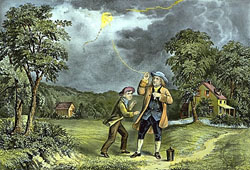Benjamin Franklin And Electricity
|
| updated |
Copy Link Code
|
 In 1752, Benjamin Franklin ventured out into a summer storm with a kite, a key, and a daring hypothesis. According to contemporary accounts, Franklin managed to draw lightning out of the clouds and retain the charge in a copper key attached to the wet kite. Did Benjamin Franklin discover electricity? No, actually electricity was a recognized force in science for hundreds if not thousands of years. Ancient batteries have been discovered in the Middle East composed of varying chemicals inside clay jugs with metal plugs. Benjamin Franklin's experiments revolved around the hypothesis that lightning was indeed electrical in nature, a theory that had yet to be proven. Another Benjamin Franklin discovery of electricity was his assertion that the two forms of electric charge were positive and negative, defined by the pressure of the current. In the time of Ben Franklin, electric charge was not fully understood or agreed upon by physicists; his discoveries would advance the field of electrical study and earn him praise around the world.
In 1752, Benjamin Franklin ventured out into a summer storm with a kite, a key, and a daring hypothesis. According to contemporary accounts, Franklin managed to draw lightning out of the clouds and retain the charge in a copper key attached to the wet kite. Did Benjamin Franklin discover electricity? No, actually electricity was a recognized force in science for hundreds if not thousands of years. Ancient batteries have been discovered in the Middle East composed of varying chemicals inside clay jugs with metal plugs. Benjamin Franklin's experiments revolved around the hypothesis that lightning was indeed electrical in nature, a theory that had yet to be proven. Another Benjamin Franklin discovery of electricity was his assertion that the two forms of electric charge were positive and negative, defined by the pressure of the current. In the time of Ben Franklin, electric charge was not fully understood or agreed upon by physicists; his discoveries would advance the field of electrical study and earn him praise around the world.
Although the answer to the question, "Did Benjamin Franklin invent electricity?" is a resounding "No," he did follow up on the discoveries of his electric experiments with an invention that is still used today. During his experiments, he found that conductors with sharp points could draw electric currents silently and at farther distances than smooth ones; this conclusion led him to the invention of the lightning rod. The lightning rod could protect wooden buildings from fire by drawing lightning strikes into a safe path of conduction from the top of the building, down a wire and into the ground. After he demonstrated the usefulness of lightning rods with an installation on his own house in Philadelphia, they were installed on buildings at the Academy of Philadelphia (predecessor of the University of Pennsylvania) and the Pennsylvania State House (soon to become Independence Hall). As with all of his inventions, Franklin refused to take out a patent on the lightning rod and instead enjoyed the social benefit he had created for his community and the world.
Benjamin Franklin and electricity innovation added to his prestige as an eccentric polymath, but other Benjamin Franklin discoveries also solidified his standing. Franklin was an early theorist of ocean currents and helped map the Gulf Stream of the Atlantic Ocean. Franklin also helped establish theories about the concept of cooling and its relation to evaporation as well as the conductivity of objects under varying temperatures. Thomas Malthus gave Franklin credit for discovering methods for tracking population growth; Franklin had first established these methods when he hypothesized that the abundance of food in America would lead the colonists to a surge in population that would trump Britain within decades. While it is not true that Benjamin Franklin discovered electricity, it is possible that without the experiments of Ben Franklin, light bulb innovation and other basic conveniences of modern life would not have advanced as quickly. On all things scientific and electric, Ben Franklin was an advanced thinker for his time.
